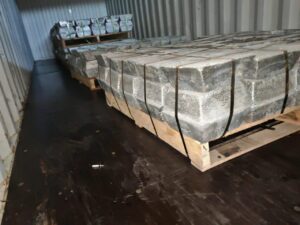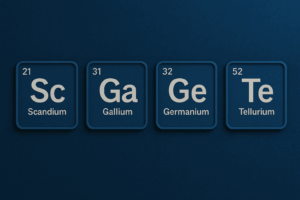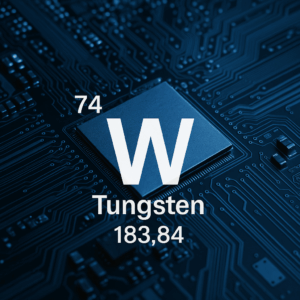The global race for critical minerals reached a new milestone this week, as Critical Metals Corp (CRML.O) signed a rare earth supply agreement with a United States government-funded facility, Ucore Rare Metal’s (UCU.V). This arrangement underscores the shifting dynamics in commodity markets as nations scramble to secure resources essential for economic competitiveness, defense capabilities, and the transition to clean energy.
The Strategic Role of Rare Earths
Rare earth elements may account for only small fractions of final components, yet they are indispensable in a wide array of modern technologies. From the permanent magnets in electric vehicles (EVs) and offshore wind turbines to sophisticated radar and missile systems, rare earths are the “vitamins” of high-tech manufacturing.
Demand trends point to accelerated consumption over the next decade. Global decarbonization targets, ongoing investments in renewable energy, and surging EV adoption are redefining the economics of these elements. Today, the United States is making a concerted push to ensure that it has dependable channels to access what many analysts consider “the oil of the 21st century.”
A Win-Win Agreement
The supply deal with Critical Metals positions the company as a key participant in this realignment. By agreeing to deliver rare earth elements to a U.S. government-backed processing facility, Critical Metals will help Washington advance three strategic objectives:
- Reducing reliance on foreign sources – Currently, global supply chains are heavily reliant on a handful of countries, creating risks for both energy transition and national security.
- Scaling domestic processing capacity – The deal supports federal efforts to establish a vertically integrated supply chain inside the United States, from raw material imports to advanced component manufacturing.
- Securing long-term partnerships – With surging demand forecast by 2030, stable supplier agreements will be critical to avoid price volatility and shortages.
Why the Move Matters to the US
The United States imports most of its rare earths, primarily from China. In recent years, Beijing’s near-monopoly in refining and processing rare earths has raised alarms. Policymakers worry about the geopolitical risks of overdependence, particularly if global tensions escalate. The Critical Metals deal is therefore part of a broader policy playbook aimed at diversifying supplies.
For Washington, the benefits extend beyond economic security. Rare earths are a linchpin in clean energy deployment. Without them, plans to expand EV fleets or build enough renewable capacity to hit climate targets could stall. This supply contract not only insulates America from market volatility but also strengthens the backbone of its industrial strategy.
Benefits for Critical Metals
The deal marks a significant commercial leap for Critical Metals Plc. The London-traded company gains more than just a customer—it earns strategic relevance. Aligning with the U.S. government effectively elevates its profile within the industry, potentially opening the door to additional contracts and investment opportunities.
For investors, such agreements often serve as validation of a company’s operational credibility. They can also offer more predictable revenue streams, a rare commodity in the natural resources sector where prices fluctuate with every policy announcement or geopolitical event.
Global Competitive Landscape
Other nations are closely watching the United States’ moves. The European Union, Canada, and Japan are all crafting policies to shore up supplies of rare earths and critical minerals. The aim is the same: ensure that access to these resources does not become a bottleneck in the race toward a low-carbon economy.
Against this backdrop, the Critical Metals agreement signals to international actors that resource diplomacy is entering a new phase—one marked less by open markets and more by strategic bilateral arrangements. Put simply, competition for rare earths is intensifying, and government-to-company partnerships are likely to become a critical mechanism of supply chain security.
Implications for Clean Energy and Defense
Rare earths are not just an economic story—they are also integral to national security. Defense contractors rely on them for precision-guided munitions, stealth aircraft, nuclear submarines, and secure communications systems. Ensuring an uninterrupted supply is therefore a matter of strategic defense planning as much as it is about industry.
On the energy side, the implications are just as weighty. The International Energy Agency estimates demand for rare earths could increase threefold by 2040, driven primarily by clean energy applications. Without investments in supply chain resilience, energy transitions in the U.S. and elsewhere could face serious delays.
Industry Expertise: A Shift Toward Collaboration
Market observers view this agreement as a signal of growing interdependence between private resource developers and government-backed infrastructure. Unlike previous decades, where companies pursued projects independently, today’s rare earth sector depends increasingly on public-private partnerships.
Analysts note that Critical Metals’ move reflects not only commercial opportunity but also a willingness to align with national strategies. As demand rises, such collaborations could emerge as a blueprint for ensuring resilient supply chains worldwide.
Future Outlook
Looking ahead, several key questions remain: How fast can the U.S. ramp up its processing capacity? Will additional supply agreements with other countries materialize, or will Washington double down on nurturing homegrown mining initiatives? And how will China respond to efforts aimed at reducing its dominance?
For Critical Metals, the outlook is buoyant. Beyond rare earths, the company’s positioning in the broader critical minerals market means it could ride a wave of structural demand for materials such as cobalt, lithium, and nickel. In an environment where policymakers and industries alike are striving for resource security, being part of the solution could become a powerful growth driver.
Conclusion: A Pivotal Step in Resource Security
The ink on this agreement does more than seal a deal—it marks a new chapter in how nations and companies conceptualize strategic resources. Critical Metals’ partnership with a U.S. government-funded facility encapsulates the urgency of building stable, diversified supply chains for the rare earths essential to clean energy and defense.
As decarbonization goals mount and geopolitical uncertainties persist, similar agreements will likely follow. For now, Critical Metals has positioned itself not just as a commodity supplier, but as a strategic actor in shaping tomorrow’s economic and energy security landscape.





